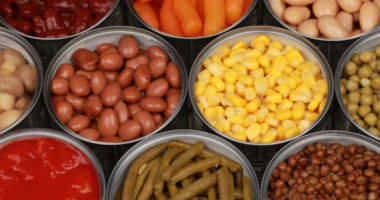What Happens to Your Body When You Eat the Same Foods Every Day?
Figuring out what to eat every day is a drain—a triple drain if you’re figuring it out for an entire household. Eating? Fun. Meal planning? Not so fun.
It’s part of why it’s so easy to get into a routine of eating the same thing every day. Maybe you start your day off with the same breakfast, whether it’s eggs, a bowl of oatmeal, or a smoothie. Then for lunch, you have some iteration of a salad with the same handful of ingredients. (Maybe you go wild and switch up the dressing.) For dinner, it’s one of the seven recipes you have memorized that take a minimal number of ingredients and effort. Maybe you’ll dust off a cookbook on Sunday when you have more time. Can you relate?
Now there is certainly value in having an arsenal of quick-and-easy meals up your sleeve. And, hey, as long as you’re covering your nutrient bases at every meal, who cares if you eat the same thing on repeat? Here’s the thing, though: According to gut health experts, eating the same foods every day isn’t such a good idea—yes, even if they’re healthy foods. South Carolina-based gastroenterologist and Fiber Fueled author Will Bulsiewicz, MD, even goes so far as to say that eating a variety of foods (specifically, plant-based foods) is the very best action you can take in terms of gut health. “The single greatest predictor of a healthy gut microbiome is the diversity of plants in your diet,”.
Tim Spector, MD, a professor of genetic epidemiology at King’s College London and the scientific co-founder of microbiome health company Zoe, has seen firsthand exactly how eating the same thing every day affects the gut. He sees it through his work with Zoe and his scientific research, and even saw it in a mini-study he conducted himself when he enlisted his son to eat nothing but McDonald’s for 10 days. “That experiment was in 2015 and even now, he’s still not back to his pre-McDonald’s level of gut bacteria diversity,” Dr. Spector says.
Okay, a Mcdonald’s diet is one thing. But what if your “same foods diet” is healthy? Here, Dr. Spector explains what happens in both cases and gives more intel on why gut bacteria diversity is so important.
What happens to the body if you eat nutrient-void foods every day
Let’s start by digging more into what happens if someone eats the same foods every day and these foods have minimal nutritional value. For Dr. Spector’s son, he started noticing a huge change in his health only four days into the experiment. “He called me up and asked if we could stop the study because he was feeling so unwell,” Dr. Spector says. “He was lethargic and his friends told him he was looking pale.” His son also conducted a microbiome test during this time—again, just four days in—which found that he lost between 30 percent and 40 percent of bacteria diversity in his gut. Then, he had to continue on for six more days.
Eating the same foods every day not only minimizes the variety of bacteria living in the gut, but nutrient-poor food is made with sugars, inflammatory oils, and additives that actually kill the good gut bacteria that is living there, allowing inflammation-causing bacteria to thrive in its place. Dr. Spector explains that the combination of this is detrimental to health, both short-term and long-term. In the short term, Dr. Spector says eating the same, nutrient-poor foods can lead to low energy, brain fog, and digestive problems. You’re also more likely to get sick because the immune system weakens. As for the long-term, eating this way has been scientifically linked to a long list of health problems including depression, Alzheimer’s disease, and certain forms of cancer. This is exactly why easy access to nutrient-rich foods is a critical public health issue.
What are the best foods for gut health? Watch the video below to find out:
What happens to the body if you eat the same healthy foods every day
Okay, so the detriments of a long-term junk food diet are clearer than Sprite. But is eating the same thing every day really all that bad if the foods are nutrient-rich? “If you’re eating the same kale salad every day, you’re not going to get the diversity of gut microbes that you would if you had a different type of salad every day, like a cabbage salad one day and a grain-based bowl the next, for example,” Dr. Spector says. Sure, you may technically be hitting your nutrient goals, but you could still do better in the gut health department.
“Nutritional health isn’t just about counting off nutrients, it’s about feeding the tens of thousands of microbes in our gut,” Dr. Spector says. Just like how low gut bacteria increases the risk of depression, Alzheimer’s disease, and certain cancers, Dr. Spector says the inverse is true; a greater diversity of gut bacteria lowers the risk for these—even if you are getting enough protein, fiber, and other nutrients.
So, just how diverse should your diet be? “A scientific study that took into account over 11,000 people found that the sweet spot for the best gut bacteria diversity is eating 30 different types of plants a week,” Dr. Spector says. It may sound like a lot—and it is—but if you actually sit and list out all the different types of plant foods there are, you’ll see it’s actually manageable to achieve. Vegetables, fruit, grains, seeds, nuts, beans, legumes, soy, and herbs are all ways to get there.
Some people may wonder if eating the same food every day can lead to developing a sensitivity to that food. For example, if you eat eggs every day, can you develop a sensitivity to eggs? Or perhaps you wonder the opposite, if you don’t eat a certain type of food for a prolonged amount of time, can that lead to a sensitivity? Dr. Spector says that in both cases, the jury is still out. “It’s something I’ve heard anecdotally, particularly about not eating a certain food leading to trouble digesting it in the future, but there is not hard scientific evidence for either situation,” he says. That doesn’t mean it doesn’t happen; listening to your body is always important, especially if you feel something is causing you digestive distress.
Feeling encouraged to break out of your same-meals-on-repeat cycle now? What new food are you going to add to your grocery cart next time you’re at the store? Whatever you land on, there’s certainly no shortage of recipe ideas a Google search away. If you’re really hard up on what to make, ask Us Facebook group of over 15,000 people for ideas. After all, even foods you really love can get tiring. “Kale is great, but if that was all you had in your diet, it would be pretty dreadful,” Dr. Spector says. True enough.








